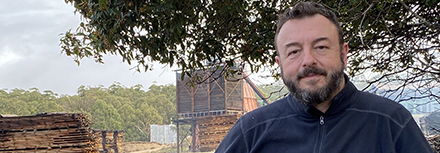The ABC’s Audience and Consumer Affairs Department has admitted that a recently published story made a series of errors which showed Australian forestry in a negative light. Justin Law, Managing Director of community group, Forest and Wood Communities Australia, made the complaint to the ABC about an article titled Deforestation in Australia: how does your state (or territory) compare? Source: Timberbiz
Mr Law said it was a relief to know that there were people at the ABC still committed to fair and reasonable reporting.
“The author of the article has an anti-forestry agenda that is clearly evident in the way this article was compiled,” Mr Law said.
“To have that recognised by the ABC’s Audience and Consumer Affairs Department is important and hopefully will lead to more balanced reporting of forestry issues.
“All we want is a fair go and for claims about forestry to be properly investigated before they are reported as fact.”
Mr Law said FWCA would continue to keep a close eye on the media’s treatment of forestry issues.
“Corporate activists have made an industry out of manipulating the media to twist public opinion about sustainable forestry,” he said.
“We will continue to hold to account the media outlets which fail to properly do their job in looking behind the sensationalism and finding the truth.”
AFPA CEO Ross Hampton said it was encouraging that the national public broadcaster’s fact checking processes was clearly working
“This retraction and correction to key parts of the lengthy science article are a great credit to ABC management,” he said.
“The tens of thousands of men and women who work in our native forest industries around the country, and many who were upset by the original story, will join AFPA in welcoming this outcome.
“What remains deeply perplexing however is how the serious reporters and producers in the ABC Science unit could have held such views about our sustainable forest management in the first place?
“Even those with a modest understanding of forest industries in Australia would have known that the state forest agencies emphatically do not practice ‘deforestation’, as was implied in the report.
“In fact, this would be completely illegal. Australian native or regrowth forestry is completely sustainable and can continue forever, as the regeneration and replanting process which takes place after harvest is just as important to our forestry operators as the timber getting.”
Mr Hampton said it was also puzzling that the ABC Science reporter did not seem to understand how Regional Forest Agreements (RFAs) between the State and Federal Governments work.
“The ABC now admits it was wrong to imply that RFAs do ‘not include environmental protections’.”
Mr Hampton said that while the apology to Mr Law and published correction was a very welcome development, the fact that the correction would be disseminated within the wider ABC and reported to the ABC Board, offered hope that such simple errors regarding forest industries will be avoided in the future.
The ABC’s response:
“Your complaint has been investigated by Audience and Consumer Affairs, a unit which is separate to and independent of content making areas within the ABC. Our role is to review and, where appropriate, investigate complaints alleging that ABC content has breached the ABC’s editorial standards. These standards are explained in our Editorial Policies: https://edpols.abc.net.au/policies/. We have carefully considered your complaint, sought information from ABC Science and assessed the article against the ABC’s editorial standards for accuracy and impartiality. Audience and Consumer Affairs have concluded that the article did not meet the requirements of the ABC’s editorial standards for accuracy and impartiality.
On accuracy, ABC Science accepts that:
- the article conflated land clearing with deforestation; the inaccurate references to deforestation, including in the title of the story, have been now been corrected;
- reasonable efforts were not made to verify images purporting to show illegal logging; that footage has now been removed;
- inadequate context was provided regarding forestry, including that commercial forestry activities regrow / replant trees; this context has now been included in the story;
- inadequate context was provided in the Victoria and Tasmania sections which had the effect of overstating the role of native forest logging in land clearing; this context has now been included in the story;
- inadequate context was provided in reference to the Regional Forestry Agreements (RFAs); the fact that RFAs have environmental protections has now been made clear;
- the definition of woody vegetation under the National Greenhouse Accounts guidelines has been corrected.
The inaccuracies and lack of context in the article had the effect of unduly highlighting the role of commercial forestry activities in land clearing and was therefore was not in keeping with the ABC’s editorial standards for impartiality. In addition to the corrections noted above, an Editor’s Note has been appended to the article and a correction has been published on the ABC News Corrections & Clarifications page. In keeping with Audience and Consumer Affairs’ usual practices, a summary of this finding will be published on the Upheld Complaints page and reported to the ABC Board. The ABC apologises for these serious editorial lapses.
Your complaint also raises broad concerns about the use of the NGA data in the article, and that the rate of land clearing in the story is overstated. ABC Science have explained that the NGA data was used because it is the only available government data based on a nationally consistent methodology. Audience and Consumer Affairs are satisfied that it was reasonable to use the NGA data, and we note that it was made clear that according to the NGA data: “there has been a net increase in tree cover” during the reporting period.
Thank you once again for bringing your concerns to our attention.”






